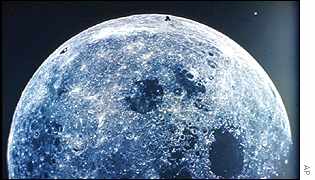| You are in: Science/Nature | ||||||||||||||||||||||||||||||||||||||||||||||||||||||||||||||||||||||||||||||||||||||||||||||||||||||||||||||||||||||||||||||||||||||||||||
|
Monday, 20 May, 2002, 16:00 GMT 17:00 UK
China sets date for the Moon

China has an ambitious space programme
China says it is planning to establish a base on the Moon to exploit its mineral resources.
A chief scientist with China's Moon exploration programme, Ouyang Ziyuan, said that the country was planning to launch its first mission to the Moon in 2010. He reportedly told the Beijing Morning Post: "Our long-term goal is to set up a base on the Moon and mine its riches for the benefit of humanity." China announced last year that it was planning to launch a manned flight into space by 2005, and in March China successfully launched its third unmanned test flight of a Shenzhou space capsule. Only two countries - the former Soviet Union and the United States - have achieved manned space flight. In training The official China Daily said the country was already training 12 astronauts to prepare for the nation's first manned space mission.
China first announced a four-step, manned spaceflight programme in 1999, which included plans for a space station served by shuttle-style vehicles. Correspondents say China's main motivation for space exploration is to raise national prestige, both at home and overseas. But China's space industry suffered a series of setbacks in the mid-90s. A Long March 2E rocket carrying a telecommunications satellite exploded after blast-off in January 1995, killing a family of six. Another rocket blew up after take-off in early 1996 and, later in the year, a Long March rocket placed a $120m Chinese satellite in the wrong orbit, leaving it to drift hopelessly in space.
|
See also:
23 Nov 01 | Asia-Pacific
09 Jul 01 | Science/Nature
15 May 02 | Science/Nature
13 May 02 | Science/Nature
05 May 02 | Science/Nature
11 Aug 00 | Science/Nature
16 Jul 99 | The moon landing
Internet links:
The BBC is not responsible for the content of external internet sites Top Science/Nature stories now:
Links to more Science/Nature stories are at the foot of the page.
|
||||||||||||||||||||||||||||||||||||||||||||||||||||||||||||||||||||||||||||||||||||||||||||||||||||||||||||||||||||||||||||||||||||||||||
|
Links to more Science/Nature stories |
 |
||
| ----------------------------------------------------------------------------------
To BBC Sport>> | To BBC Weather>> | To BBC World Service>> ---------------------------------------------------------------------------------- © MMIII | News Sources | Privacy |